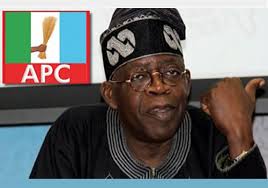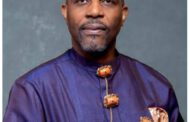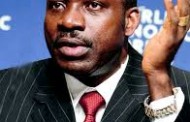By Lekan Fatodu
The former Governor of Lagos State and National Leader of the All Progressives Congress (APC), Asiwaju Bola Tinubu is undoubtedly a man running on enormous wits.
According to those close to him, Tinubu’s uncanny knack for solving complex problems, especially when others are at crossroads is his greatest weapon of influence and power.
Feelers had it that, in the run up to the 2015 Presidential election, a watershed that paved the way for the first victory of the opposition against a ruling party in Nigeria’s history, Tinubu as the leader of the then leading opposition party (ACN) had used his influence to rally other fragmented parties in the opposition to form what would later become the most formidable and biggest opposition party (APC) which eventually wrest power from the incumbent PDP in April this year.
It was also remarked that as part of the moves towards achieving this feat, Tinubu aggressively advocated a bloodless revolution which he aptly christened ‘common sense revolution’. This revolution, he posited, would be achieved through a peaceful agitation for a change, and for a better Nigeria.
He followed his conviction on the practicability of this variant of revolution with a 40-page book titled – Common Sense Revolution. In it, he highlighted some of the challenges faced by Nigerians and Nigeria, and provided many socio-political and economic interventions through which the myriads of problems bedeviling Nigeria can be effectively tackled.
The Vice President, Prof. Yemi Osinbajo, (he was, at the time the book was published, the Vice Presidential Candidate of the All Progressives Congress) submitted in the foreword of the book that: “This nation needs to return to decency and straightforward, common sense way of resolving our challenges”.
Prof. Osinbajo also added that: “This document (the Common Sense Revolution book) along with the manifesto of the All Progressives Congress (APC) will become the milestones of progressive ideals in our nation”.
While juxtaposing these profound pronouncements with the latest political development in the country particularly in the new “House of Change” (the 8th National Assembly), one can conveniently glean some obvious contradictions between the ideals the newly elected officials proclaimed ever so loudly in the days preceding the elections and the path they now seem to be headed with their current posturing and leadership crisis.
Therefore, it may be safe to say that the principles that would uphold sound progressivism in Nigeria could be short-changed by some pretentious reactionaries that could frustrate the spread of such lofty ideals if pragmatic decisions and pro-people reforms are not urgently accorded priority.
Truly, in saner climes and as elaborately espoused in the book, there are actions that should ordinarily be dictated by the application of simple propriety both by leaders and the citizens. That our leaders are duty-bound to deliver, at the least, on basic services to the people is, of course, a matter of plain common sense; and that we, the citizens, should be provoked to action when we are taken for a ride by a government we voted into power is, by all means, a matter of elementary cognition.
Requirements such as the foregoing are called a no-brainer! The predilection for good deeds doesn’t demand grueling mental exertion or technical know-how from the political opportunists who parade our national life and in whose hands the key to the nation’s treasury has, unfortunately, been entrusted.
That Nigerians are seriously in need of stable electricity, better hospitals, good roads, sound educational system and other necessities favoured by plain common sense which, of course, should be the drive of any reasonable government is an incontrovertible fact.
In fact, the greatest onslaught on the common sense of the generality of Nigerians is the body language of the crop of politicians who presently sit at the National Assembly and are already getting itchy and ready to bamboozle the Revenue Mobilization Allocation and Fiscal Commission (RMAFC) into validating their preposterous allowances even under the current harsh economic climate.
Some of the well-meaning politicians, policy-makers, and technocrats who sacrificed all in making this new government a reality should know that their apparent ambivalence and taciturnity in the face of their colleagues’ indecency and insensitivity is not healthy in the early life of Buhari’s administration. It is what Professor Wole Soyinka alluded to in The Man Died. To keep silence in the face of oppression is to allow a more dangerous thing to happen.
If truly, as Prof. Osinbajo was earlier quoted, the common sense document and the APC’s manifesto run in tandem, then the APC’s lieutenants, especially the beneficiaries of the electoral capital of the persuasion of change who apparently gave allegiance to the agenda of the party during the campaign, should be urgently called to order and made to re-dedicate themselves to the true service of the people.
It is instructive to note that the propagation of “common sense” as an ideal for social justice and change has been successfully experimented by some visionary leaders in the advanced democracies of Europe and North America. Actually a pamphlet, with the same name, released by a renowned English-American political activist, Thomas Paine in 1776 was regarded as the intellectual and ideological fire that largely ignited the call for the liberation of the Colonies from the British Empire and led to the American independence.
Now that Nigerians have equally responded to the push of Common Sense through the successful enthronement of a new government, the task before Tinubu and the direct beneficiaries of this popular mandate who currently occupy several political offices is to really make sense in their words and deeds.
The vote for change and support for the Common Sense Revolution wasn’t a vote for public officers and “Change-agents” who can not make personal sacrifices of buying their newspapers, toothbrushes, bathroom flip-flops and toiletries to save every Kobo available towards revamping the crippling economy.
Quite ironically, many of these politicians, from the federal to the state level, who are asking for wardrobe allowances and other ridiculous and indecent perks of office through the connivance of a feckless Revenue Mobilization Allocation and Fiscal Commission (RMAFC) can conveniently feed a whole community. Yet, their inherent gluttony has beclouded them against propriety.
So, Asiwaju, the Nigerian apostle of common sense, should brace up for the task ahead. He and his Generals behind the timely Common Sense Revolution shouldn’t be too complacent and presume that the popular revolt that ushered in the Buhari-Osinbajo-led government was just against the PDP that largely took the stick in his book as the only cankerworm that was eating up the society. Rather, it was an audacious move against all the greedy elites (across every political party in Nigeria) who place their personal interest above the interest of the nation.
Moreover, basic knowledge has hinted, and as equally corroborated by Tinubu in that citizen-focused literary endeavour, that fierce provocation and confrontation from the people await any politician and government practice that tend to subvert the yearnings of the people in this new Nigeria.
Fatodu, a United Kingdom-based journalist is a media entrepreneur and publisher of Check-Out magazine













